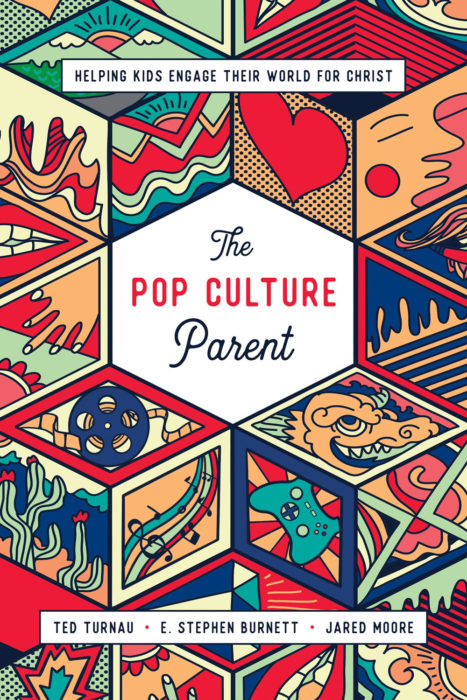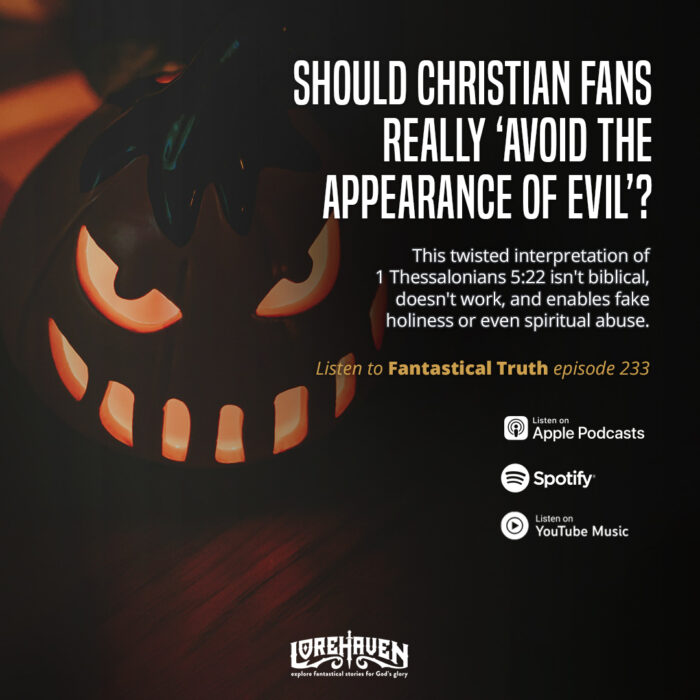233. Should Christian Fans Really ‘Avoid the Appearance of Evil’?
Podcast: Play in new window | Download (Duration: 1:00:08 — 56.4MB) | Embed
“Judge not” gets twisted to shut down God’s Law.1 The phrase “money is the root of all evil” gets twisted to shut down biblical ambition. And “no eye has see, no ear has heard” often gets twisted to shut down a longing for Heaven. But what twisted Scripture most often gets used to reject Christ-exalting fantastical imagination? This top text may be 1 Thessalonians 5:22: “Avoid the appearance of evil.” But does that text actually say to avoid not just actual evil, but anything that appears evil in the eyes of … someone?
Episode sponsors
- Enclave Publishing: The Immortal Abyss
- Exile’s Hope by David Liberto
- The Lorehaven Guild: Amish Vampires in Space book quest
Mission update
- Josh Shepherd exclusively interviewed Rings of Power showrunners.
- Jessica Boudreaux shared concerns about increasing YA sensuality.
- We’ve launched upgrades to Lorehaven.com, especially the Library.
- Subscribe free to get updates and join the Lorehaven Guild.
Concession stand
- We are speaking here against a deep Bible misconception.
- For a moment, you may feel like we’re denying actual gospel.
- The myth is so common that even Google AI refers to the Scripture twist:
Some commentaries on the meaning of this verse include: . . .
- Avoiding not only the identical evil thing itself, but all shows and resemblances of it
- Terminating contact with any place, action, language, or relationship that gives people the impression that you are doing something wrong
- Notice our frequent use of the word someone. That’s by design.
- And that’s because some unknown someone often haunts this topic.
- Who is the someone? Why are we following his/her notion about “evil”?
1 Thessalonians 5:22 says:
Abstain from all appearance of evil. (KJV)
Reject every kind of evil. (NIV)
Abstain from every form of evil. (ESV)
Stay away from every kind of evil. (CSB)
 1. 1 Thess. 5:22 only refers to actual evil actions.
1. 1 Thess. 5:22 only refers to actual evil actions.
- Nothing in this verse, in English or Greek, means not evil but looks like it.
- The verse speaks only about avoiding actual evil wherever this appears.
- So many misread this that we address it fully in The Pop Culture Parent:
Some Christians believe we must not only avoid committing actual sins but also avoid anything that could appear evil to someone else. However, a quick study of the full chapter in 1 Thessalonians shows that the term eidos (“appearance” in the King James Version) has nothing to do with someone’s opinion of how something looks.
Paul tells Christians to respect teachers but also test them, no doubt by comparing their teachings with Scripture and the gospel. They must avoid false teaching—not what appears to be false but what is actually false. The King James Version’s “appearance” is better translated into current-day English as “form” or “kind” of evil. In fact, no modern Bible translation uses “appearance” here, and original readers of the KJV probably took appearance of evil to mean actual evil.
The Pop Culture Parent, page 82
2. One does not simply avoid things that look evil.
- Recently we saw this standard applied to the so-called Billy Graham rule.
- But for most people (especially outside non-vocational) ministry, it’s impossible to never be technically “alone” with an opposite-sex person.
- If we tried to do this, we’d be subject to unbiblical notions of “evil.”
- Some people claim the Bible itself is evil. Should we avoid that too?
- Not even Jesus Christ himself followed this “rule” to the letter.
Indeed, to misread [this verse] as meaning “anything that might look evil” leads to an absurd standard no one could keep, not even Jesus. He ate with sinners and talked with prostitutes, and the Pharisees thought his actions appeared to be evil. Jesus claimed to be the great I Am, and the Pharisees picked up stones because it appeared that Jesus had committed blasphemy.
The Pop Culture Parent, page 83
3. If we try doing this, someone will be haunting us.
- We see many bad Christians manipulate others with this “standard.”
- They always assume (not prove) that they are the haunting “someone.”
- But why should their special view of “appearance” control everyone else?
- This toxic brew will only generate worsening cycles of fake “morality.”
- We also see many non-Christians impose fake “morality” in this way.
- Too many sincere Christians are fooled into pleasing humans, not God.
- And for Christian fans, we often select/avoid stories based on this “rule.”
- Our recommendation: reject the “rule” as antibiblical and fake “holiness.”
Christians must not let a misreading of this verse restrict our freedom to enjoy certain things with thanksgiving to God. Moreover, if we misuse this verse, we may be fueling hypocrisy, teaching our children that we value outward appearances more than the truth.
The Pop Culture Parent, page 83
Com station
Top question for listeners
- Have you ever tried to avoid not just evil, but things that look evil?
@a.r.grosjeanauthor replied on Instagram about Jessica’s article:
I agree. Cuddles and kisses should be as good as it gets for anyone under 18. Even if it hints for sex behind closed doors should be left out. Adult books are fine for anything more than that. I know kids these days do read adult books but it shouldn’t be in YA stories. ❤️
@salmon_dabarn also replied on Instagram:
They use the term wholesome for video games too and they are the furthest things from it👏👏
Next on Fantastical Truth
We just upgraded Lorehaven.com, especially the Library with its many genres and subgenres. Nearly 1,400 titles cover a wealth of Christian-made fantastical fiction going all the way back to The Hobbit. Most of those published titles are fantasy. That’s the most popular genre today. But what might be the future of Christian-made fantastical storytelling? Kara Swanson and Brett Harris, directors and co-founders of The Author Conservatory, give us a glimpse into what themes and types of stories they see from upcoming authors.
- Photo by Peyman Shojaei on Unsplash. ↩






























“Appearance” and “Form” can often mean the same thing. “Every kind”: leading people astray, which is the potential hazard of being callous about how we appear to others, can also be a “kind” of evil.
This is more simple than you’re making it out to be. But every case has to be taken individually.
The example of co-workers of opposite genders is not very sound for me.
A better example: Christians are commanded not to have intercourse until after marriage.
Suppose a Christian man and woman, both single, co-habit the same house alone. They are not sleeping together; nevertheless, they are in a position which makes it very hard to prove they are not.
The Christian onlooker would (we hope) make inquires before passing judgment; the non-believer, so often looking for any reason to find fault with us, could yell “hypocrisy “, or perhaps, “oh, it’s not such a big deal then, if they can do it so can I.”
We are constantly, whether in word or action, in a position of witnessing to outsiders.
This is why the Appearance, or the Form, or Kind of evil, is to be avoided, or rejected:
We never know who is watching.
Indeed, this is very simple. But the example of cohabitation is also very simple. The problem is not that these people would give the impression that they’re sinning. Instead, they are actually sinning. It’s wrong for an unrelated single man and single woman to live to together as if they are married, when they are not. For those who’ve done it, of course, Christ forgives every repentant sinner! But the problem is not merely “appearance” but an actual form of evil—like emotional if not actual fornication.
There’s so many ways that the devil tricks us into doing things, and it’s important we pay attention to this. After all, he’s the king of lies. One way to avoid this is to ask God for help. This always has helped me. What appears wrong may not be wrong, or, in some cases, be actually wrong, and in this scenario the devil makes us juggle our judgement. He’ll say, ”What if this is really ok to do?” When really, it isn’t ok. Or, he’ll confuse us again and say, ”what if this isn’t ok,” just to mess with us and what we do. He’ll try to mess with Godly judgement, and that’s when we should say, ”Hey, Jesus, can you show me the truth?”